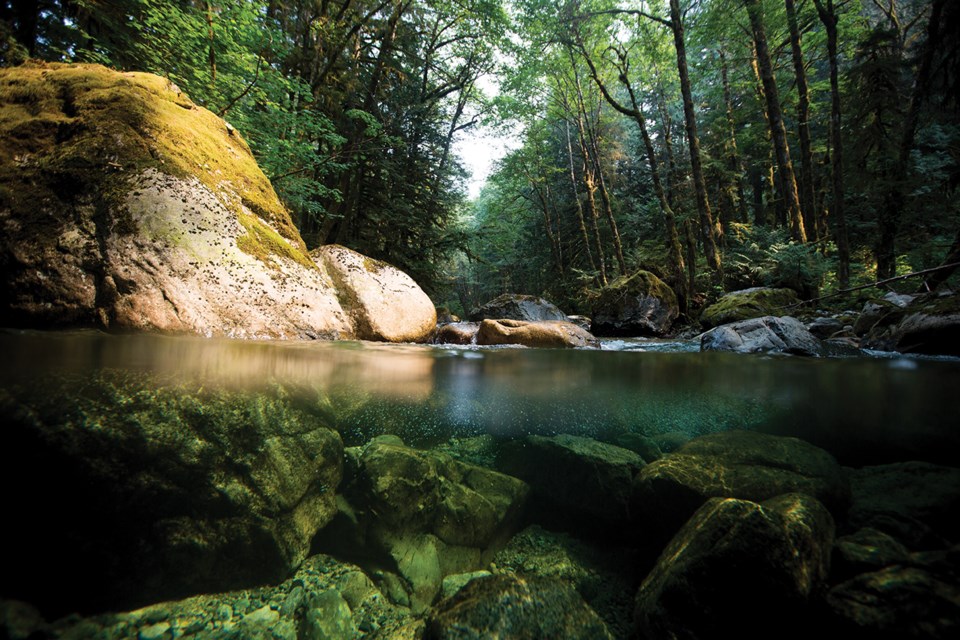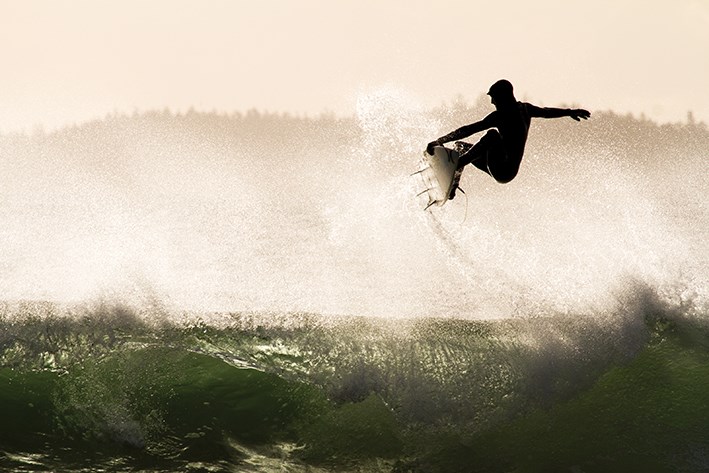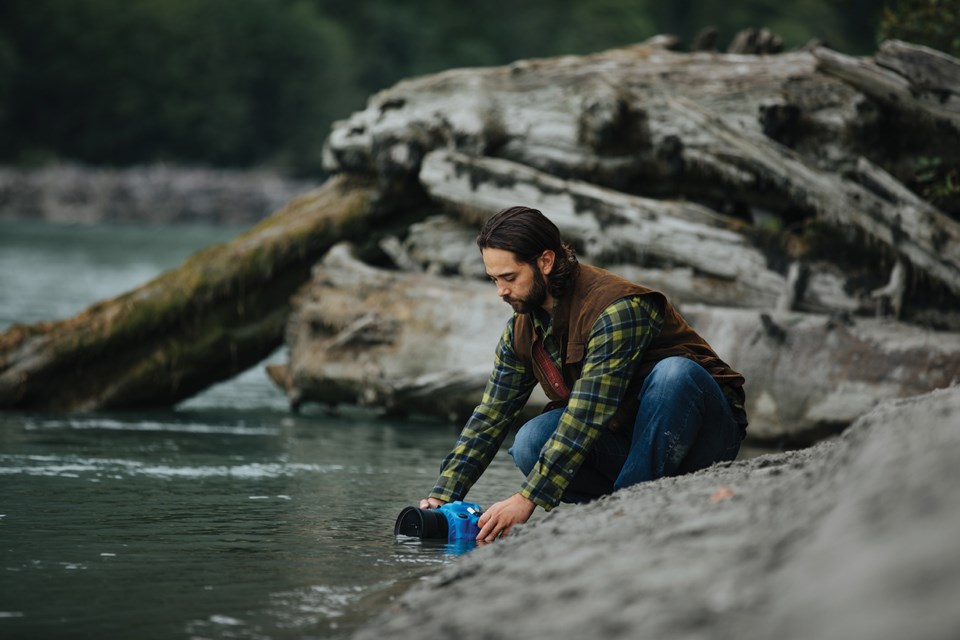Professional photographer Nick Sopczak is quintessential �鶹�����— rugged, passionate, thoughtful and happiest outside. At a local café, where he ordered a sandwich and peppermint tea (they didn’t have it, unfortunately) Sopczak, 33, waxed philosophical with The Chief about the calling of photography, what it means to find your passion and the direction �鶹�����is heading. What follows is an edited version of that conversation.
Q: How long have you been in Squamish?
A: Ten years. I had a major shift and wanted to become a photographer. I grew up in Edmonton and I thought, “I have to go somewhere new and different.” I was always drawn to mountains and nature so I just did it. I threw everything in my Subaru and said, “I am moving to �鶹�����to be a professional photographer.”
Q: What role did photography play in your life before that?
A: Not much, at least not professionally. I would travel and take pictures and then I would come home and everyone would say I should do this for real.
It all kind of just clicked.
I remember clear as day the magical moment. I was sitting at home, in my basement and I literally got called — by whatever — and I just went for a drive with the only camera I had. It wasn’t even a choice, really. I just started taking pictures of these old layers of leaves and woodsheds and rivers and I would just drive around doing that every day. I took snapshots on this old digital camera. It is unexplainable, really. It was just, “This is it.”
There were a lot of great photographers doing what I wanted to do so I kind of modelled myself around them and then I found my niche. I moved to Tofino for two years and I stayed in Hawaii often so I rotated between here, the island and Hawaii [taking pictures].
Q: In the 10 years since you started, a lot has changed in terms of photography and with everyone having cameras on their phones. What do you make of how it has changed?
A: It is like anything else, you can have good golf clubs and be a bad golfer or you can have an iPhone and be an amazing photographer, but when you want to be professional, you need both. If someone gives me an iPhone, I will take the best shot I can take with that phone. My goal is always to capture what’s there, the best that I can. To be professional, you need to give the best file available to your client. If you spend the money on gear, you get the money back.
Q: �鶹�����has also changed in that 10 years since you got here. What do you think of the direction we are going?
A: I am a very loyal local person so when things change, it really affects me. We are at a crossroads. It is one of the most special places. I have been all over the world and I come here and there is nowhere like it: the air quality, the connection to salmon, the seasons, the First Nations’ energy we have here. When I moved here I thought it was the green capital of Canada. And then it kind of switched. But as locals, you have to keep the awareness for the new people and let the local businesses know that I have a service that can help them keep the money in the community. The majority of the core people are here because we are inspired by the natural setting.
Q: One of the things you talk about on your website is how photography is deeper than images. Can you expand on that?
A: Images are powerful. They can lie, or they can tell a truth.
I wanted to have a career and a gift to the world, a passion an art so I decided to take pictures of people’s passions and things I want to learn about and things I think are important. So, I am leaving my trail through who I am working with. I get to be intentional. I have met some of the most amazing people who I never would have otherwise met. I have helped farmers and beekeepers get their websites going. I have helped herbalists.
Q: So much of what you are saying I can relate to as a journalist. Most of us get into it to do some good. But you have to make a living too and so sometimes you have to do things you might not really want to do to keep working. Do you have to walk that line or are you able to pick and choose the things that you value?
A: I definitely say to myself every morning, “What would I do if I had all the time in the world?” You have to train your mind to do something that you love. That is soul integrity. If you lose that, then you are a billionaire CEO downtown and you hate your life. For me, I would rather battle and scrape my way to my passion.
I mean, everyone tells me don’t do this because artists are broke and all that. And I get it.
I take images of people who need to get their word out there and need a voice.
When I nail a photo shoot and I get paid and they are happy and their vision is out there and they have a good societal skill, I have covered it all.

Q: I know first-hand that not everyone has an eye for photography. Can you look back and think about when you realized you had that or how you got that?
A: I have always been a kind of observer. When I played hockey, I was a goalie, when I played baseball I was a bat catcher. And I am kind of introverted so if I am at a gathering, I don’t want to be in the limelight anyway. I would rather be in the back observing, so photography kind of came naturally that way.
Q: Photographers have to take control of the situation as well though, so being introverted, was that hard for you?
A: It is a funny thing because while you are shooting you are in technical mode and then you switch and you are in social mode and bossing around maybe the bride at a wedding. Then as an observer I am noticing people’s energy and the light. When you do a big shoot there’s a lot going on. So again, my style goes back to taking people into nature. I do a series of elemental portraits; I take you into your natural element, away from the busyness. I get you feeling natural and rustic and we go into the forest and let it all go. I don’t do a lot of corporate shoots. Not that I wouldn’t, that just isn’t my style. My best images are things like a fisherman tying a fly on Sunday morning or a woman with her horse.
Q: What kind of cameras do you use?
A: I have always used Cannons, mostly because they have the lenses I invested in. I thrive off of colours and layers and Cannon is known for its vibrant colours. I shoot 5D Mark IIIs and 5D Mark IIs.
Q: For people coming up behind you, wanting to do what you do, what would be your advice?
A: Just go for it. Block everything out. I never necessarily chose photography. It is definitely destiny. If you have that inside yourself, you have to do it. You just do.
For more on Nick Sopczak’s work go to.





